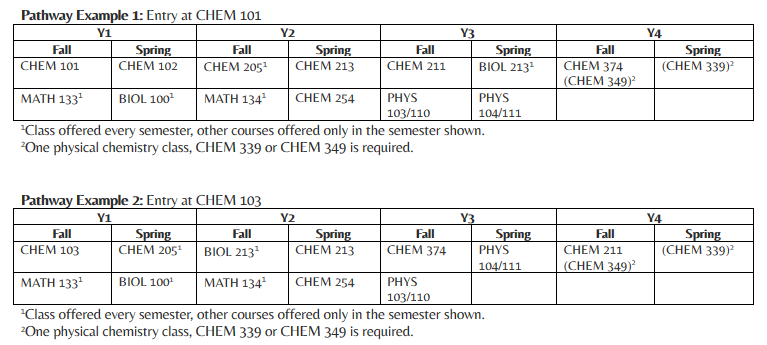| |
Feb 02, 2026
|
|
|
|
|
Course Catalog 2022-2023 [ARCHIVED CATALOG]
Biochemistry Major
|
|
|
Entry-Level Course Sequence Suggestions and Recommended Pathways
Entry-Level Course Sequence Suggestions
Other than the exceptions listed in the Advanced Placement (AP) section of the department page , the only entry points for the chemistry and biochemistry majors are in the fall. The normal general chemistry sequence is CHEM 101 (fall) and CHEM 102 (spring). For students with strong high school preparation, CHEM 103 (fall) can substitute for CHEM 101/102. Placement in CHEM 103 is based either on an Oberlin placement exam or on AP, IB, or A-level scores. CHEM 103 also has a co-requisite of MATH 133 (Calculus I). Students with exceptional preparation can petition to enter at CHEM 205 (Organic Chemistry); see the AP section of the department page . Students with no high school preparation can take CHEM 101, or may benefit from taking a non-majors class first (e.g. CHEM 045, 050, 051). Recommended Pathways
Potential Biochemistry majors are encouraged to take: - In their first year:
- CHEM 101/102, or CHEM 103
- MATH 131/132, or MATH 133
- By the end of their second year:
- As early as possible:
- MATH 134
- PHYS 103 or PHYS 110
- PHYS 104 or PHYS 111
- CHEM 254 and BIOL 213 (prerequisites for CHEM 374)
Key Constraints: - CHEM 254 and BIOL 213 must be taken ahead of CHEM 374
- CHEM 339 and CHEM 349 (physical chemistry) have MATH and PHYS pre-reqs

Transfer of Credit
Prior approval is required for chemistry course work taken away from Oberlin. Please note that, except for classes transferred in at the time of entry by transfer students, we cannot accept courses taken at community colleges. Without explicit approval from the Department of Chemistry and Biochemistry, no major may complete more than half of the full courses (or equivalent) required for the major while away from Oberlin. Normally, transfer credit for chemistry courses numbered 300 and above will not count toward the requirements of the biochemistry major.  View the detailed procedure and required forms for the transfer of credit process. View the detailed procedure and required forms for the transfer of credit process.
Honors
Students with outstanding records are invited to apply to participate in the Honors Program. Selection of honors students occurs in the spring semester for the following fall. Seniors in the program elect a minimum of 1.5 full courses of CHEM 525/526 (with at least one half course in the first semester) and work year-long (including Winter Term) on a research project. Honors students write a thesis based on their research, give two presentations, and take an oral examination. Students majoring in both chemistry and biochemistry must choose which major will be applied to any honors conferred.  View Majors Handbook for additional details. View Majors Handbook for additional details.
Biochemistry Major Course Lists
|
|
|